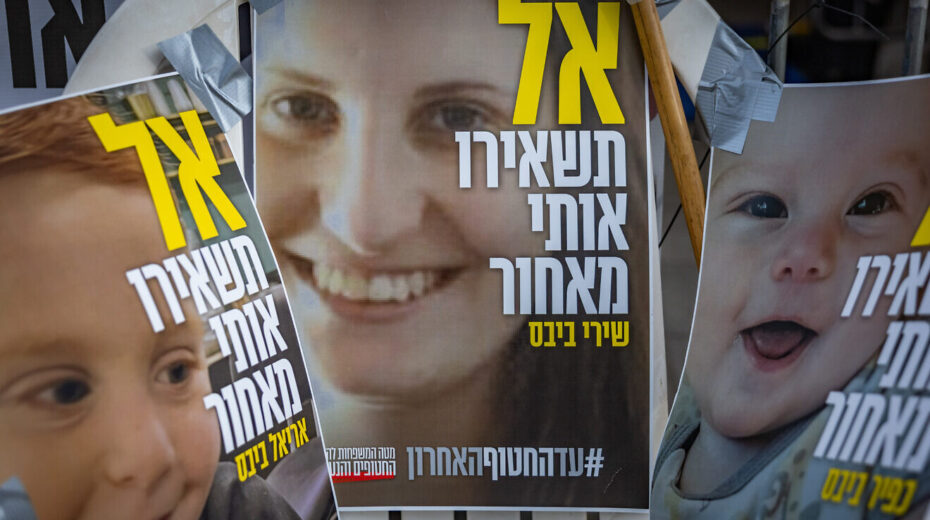Netanyahu’s Address to Combat Officers: A Call to Action
In a poignant address during the graduation ceremony of combat officers, Israeli Prime Minister Benjamin Netanyahu delivered a powerful message that underscores Israel’s ongoing struggle for survival amidst escalating conflict. His remarks, which prominently featured the imagery of a grieving family, were designed to reinforce the emotional and moral imperatives behind Israel’s military campaigns.
The Heart of Netanyahu’s Message
Netanyahu introduced the audience to the Bibas family—**Shiri Bibas** and her two young sons, **Ariel** and **Kfir**—sharing their tragic story as a symbol of what is at stake in the current conflict. “I want to show you something,” he said, holding a photo of the family. “This picture says it all. I ask that you engrave it in your hearts so you always remember what we are fighting for and who we are fighting against.” His statement was firmly rooted in the context of Israel’s fight against terror, emphasizing the severe reality that families like the Bibas are often caught in the crossfire.
“Already in the first days of the war, they murdered Shiri and her children in cold blood,” he recounted, vividly illustrating the brutal nature of the threats faced by Israel. This drew a direct line between the personal loss experienced by many and the broader narrative of national defense. Netanyahu continued, asserting the moral obligation to defeat those who would do similar harm to others. “This is why we fight. These monsters must and will be defeated. That is our mission—and your mission!”
The Situation with Hamas: A Chaotic Exchange
The backdrop of Netanyahu’s speech was marked by the recent complexities surrounding the conflict with Hamas. On **Thursday**, amidst rising tensions and ongoing violence, Hamas returned the bodies of Ariel and Kfir, but initially, they provided the wrong remains for Shiri Bibas, prompting swift condemnation from the Israeli leader. He labeled this as a “brazen violation” of their agreements.
Following a tense standoff filled with incorrect exchanges, Hamas ultimately returned **Shiri’s actual remains** on **Saturday**, which were confirmed by Israeli forensic teams. The situation highlighted the chaotic and often painful realities of hostage situations and casualty recoveries in conflict zones.
Also returned in this exchange was **Oded Lifshitz**, a resident of **Kibbutz Nir Oz**, who was kidnapped by Hamas during the assault on **October 7, 2023**. Unfortunately, Israeli authorities assert that he was murdered while in captivity, further emphasizing the brutal calculus of life and death within the ongoing conflict. The **Israel Defense Forces (IDF)** confirmed through forensic evidence that Ariel and Kfir had been willfully executed by Hamas terrorists, directly contradicting Hamas’s earlier remarks that claimed the boys had died due to an airstrike.
Strengthening Alliances and Military Readiness
Throughout his address, Netanyahu also took the opportunity to express gratitude toward U.S. President **Donald Trump**, spotlighting their shared approach to the conflict in Gaza. He noted, “We completely support President Trump’s groundbreaking plan to allow free exit for Gazans and transform Gaza into something different.” This statement reinforces the idea that Israel seeks both immediate military objectives and long-term structural changes in the region.
In a display of international diplomacy, Netanyahu thanked Trump for facilitating essential military support for Israel. “I thank President Trump for his directive to supply Israel with vital weapons. These new defensive and offensive systems will greatly aid our pursuit of a total victory,” he proclaimed, stressing the importance of U.S. military assistance in bolstering Israel’s defensive capabilities. Additionally, he mentioned the country’s commitment to investing in domestic weapon development to ensure that Israel could robustly respond to threats.
In his speech, Netanyahu reaffirmed Israel’s determination to eradicate Hamas’s operational capabilities in Gaza. “Most of Hamas’s organized military capability has been eliminated,” he reported, instilling a sense of progress in Israel’s ongoing military operations but also cautioning that the situation remains precarious. “However, make no mistake—we will see this war through to its end,” he asserted with grave seriousness. Netanyahu made it clear that Israel would pursue its objectives, whether through negotiations or military means, emphasizing the need for a comprehensive resolution to the conflict.
Future Negotiations and Persistent Challenges
In a related development, **Steve Witkoff**, designated as President Trump’s **special envoy to the Middle East**, confirmed plans to return to the region on **Wednesday**. Witkoff aims to negotiate an extension of Phase One of the ceasefire and hostage release agreement between Israel and Hamas. He emphasized the critical task ahead, focusing not just on the immediate cessation of hostilities but on ensuring that Hamas could not regain control over Gaza.
However, Witkoff cautioned that the road ahead would be long and fraught with difficulty. “Gaza will remain unsafe for at least another 15 to 20 years,” he warned, underscoring the need for extensive reconstruction efforts to create a safe environment for civilians. The complexities involved in the region’s future stability will require not just military solutions but also strategic planning for rebuilding and governance.
As Israel continues its fight against terrorism and seeks to shape the future of Gaza, the words of Netanyahu resonate as a call to action for both military personnel and the Israeli populace. They reflect a national ethos centered around resilience, purpose, and the unyielding pursuit of peace in a turbulent landscape. The path forward remains uncertain, with a myriad of challenges and challenges that will shape the region for years to come.
Fox News’ Yael Rotem-Kuriel contributed to this report.
